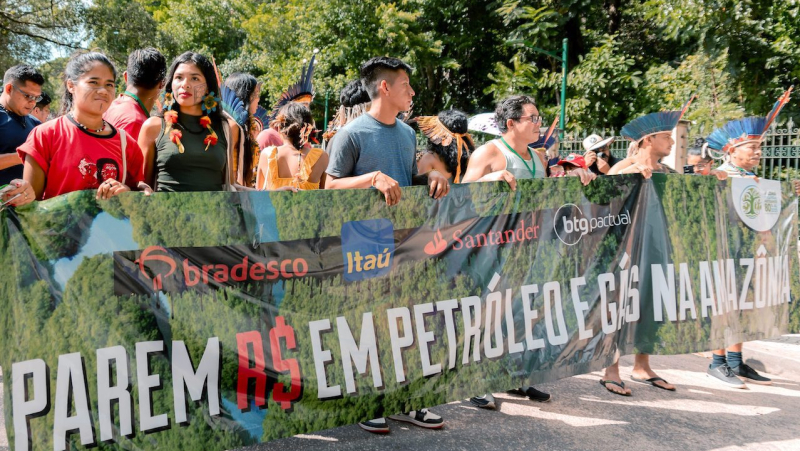Indigenous leaders call on top Brazilian banks to end financing of oil & gas in Amazonia
Matt Krogh, Co-Director Amazon Program, Stand.earth, mattkrogh@stand.earth, +1 360 820 2938 (Pacific Time)

Matt Krogh, Co-Director Amazon Program, Stand.earth, mattkrogh@stand.earth, +1 360 820 2938 (Pacific Time)
In the streets of Belém this week, members of the Articulation of Indigenous Peoples and Organizations of the Amazonas (APIAM), called on top Brazilian banks to stop the financing of fossil fuel development in their territory.
Santander, BTG Pactual, Banco Bradesco, and Itáu Unibanco all support Eneva SA, who is responsible for Azulão Complex. The project is being developed on Mura lands, without free, prior, and informed consent. According to the Indigenous people, after two years of operation of the company, it is possible to notice changes in the territories, with contaminated water and reduced hunting and fishing.
"The fish that we used to find when we went fishing, we didn't find them anymore. There is so much noise on the road that our game animals are also fleeing," says Chief Jonas Mura.
Recent research released by the Coordinator of Indigenous Organizations of the Amazon Basin (COICA) and civil society group Stand.earth, revealed that in addition to the long-known involvement of BTG Pactual, three other banks – Banco Bradesco, Itáu Unibanco, and Banco Santander – have played a major role in financing Eneva SA. Itáu Unibanco alone underwrote USD 1.3 billion worth of bonds for Eneva SA. The research report, "Capitalizing on Collapse", highlights the destructive role that each of these banks plays by investing in oil and gas development in Amazonia, in conflict with the banks' policies to support sustainability, reduce climate change, and protect Indigenous rights.
Oil and gas pollution has impacted Amazonian communities in Ecuador, Peru, and Colombia for many years, but only recently has bank financing started to support large-scale fossil fuel expansion in Brazil like the Eneva Azulão Complex project. While individual nations like the Mura continue to resist encroachment on their territories, regional efforts are also under way to stop the fossil fuel encroachment. The Amazonia for Life: Protect 80% by 2025 initiative is designed to create national-level protections for the Amazonian region, and would put in place governmental protections to stop extractivism of all kinds in regions like Mura territory.
"In our territory, the impacts of gas extraction are very concrete and immediate, but anyone who observes with a little attention, anywhere else on the planet, will also realize that financing the destruction of the Amazon and the global climate is leading us to our own destruction. As a people who live in the forest and who see, every day, that nature and human beings are one and the same, we simply cannot understand why the executives of these banks continue to destroy, instead of building a better life for everyone," said Jonas Mura, chief of the Mura people in the state of Amazonas, Brazil.
"Banks like Itaú Unibanco, Santander, and Bradesco can still be on the right side of history. They need to walk their talk and stop financing drilling for oil and gas in Amazonia. The Exit Amazon Oil and Gas platform, which supports the goals of the Amazonia for Life: Protect 80% by 2025 initiative, is a clear pathway for banks to send the signal that they want to invest in the future of Amazonia, not its collapse," says Martyna Dominiak, Senior Finance Campaigner, Stand.earth.
"Banks advertising how modern and sustainable they are, while funding oil and gas expansion in the Amazon, seems as true as a cigarette company running an ad claiming to be friendly to its customers' lungs. Rather than funding these destructive projects, banks should be investing in community-led renewable energy projects," says 350.org Latin America director Ilan Zugman.
Re-posted from the original press release on the Stand.earth website here.
